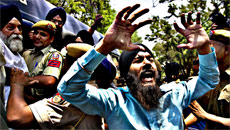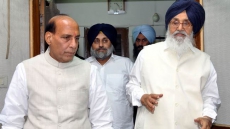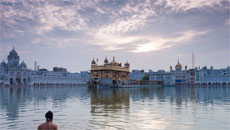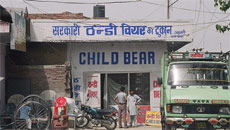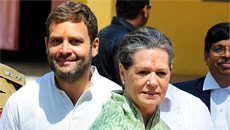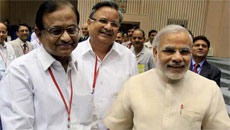Bullet trains are set to become a reality in India with the first service between Mumbai and Ahmedabad as Prime Minister Narendra Modi's government sought to run Indian Railways - one of the world's largest - like a "commercial enterprise but serve like a welfare organization".
In the Railway Budget presented to parliament Tuesday, Railway Minister D.V. Sadananda Gowda unveiled many new measures to make Indian Railways, which runs about 20,000 trains and ferries 23 million passengers daily, a modern, efficient and commercially viable utility.
He presented proposals, subject to parliamentary approval, for introduction of 58 new trains, paperless office in five years, digital reservation charts, wi-fi in select stations and trains, wake-up call for passengers, separate freight terminals, office-on-wheels for business travellers, more money for cleanliness and safety, food courts at stations, expansion of rail tourism and better connectivity in hilly areas and northeastern states.
He also promised a diamond quadrilateral project of high-speed rail connectivity between the four metros.
He said some identified stations will be developed like modern airports.
Having already hiked passenger fares by 14.2 percent and the freight carriage charges by 6.5 percent, which is expected to fetch additional revenue of Rs.8,000 crore, Gowda focused on ways to earn from other sources, such as allowing foreign equity in areas excluding operations, as also public-private partnerships.
Details, he said, would be worked out.
He said Rs.500,000 crore ($83 billion) will be required over the next 10 years to fund the modernisation plans of the network, as against the actual spend of Rs.18,400 crore in the past 10 years, but noted that freight and passenger fare hikes alone could not fetch such large requirements.
Gowda also made it clear that commercial viability cannot be sidestepped.
"An organisation of this magnitude vested with varied responsibilities, is expected to earn like a commercial enterprise but serve like a welfare organisation. These two objectives are like the two rails of the railway track, which travel together but never meet," he said in his hour-long speech.
Prime Minister Modi was quick to react. "The Railway Budget keeps in mind the development of India. We can see the great use of technology also," he tweeted, adding: "This budget strengthens institutional mechanism. It focuses on transparency and integrity."
India Inc. largely welcomed the budget, saying it is reform oriented and opens up vast opportunities for the public-private partnership in a whole gamut of areas, including cleanliness, upkeep of major stations like the airports, and IT infrastructure. The industry bodies also lauded the government's promise of encouraging domestic as well as foreign investments in the sector.
However, the stock markets reacted negatively with benchmark Sensex plunging by nearly two percent. Railway-related stocks tumbled on lower than expected increase in plan outlay. Texmaco Rail & Engineering slumped by 20 percent. Most other scrips fell at least five percent.
Gowda pegged the total planned outlay for fiscal 2014-15 at Rs.65,445 crore, which is just 1.8 percent higher than Rs.64,305 crore announced by his predecessor in the interim budget presented in February.
Ranked among the world's top five, the Indian railroad network ferries 23 million people and 2.65 million tonnes of goods daily, or 1.1 billion tonnes annually, from 7,172 stations on 12,617 passenger and 7,421 freight trains over more than 64,000 route km.
With a network stretching from Baramulla in Jammu and Kashmir in the foothills of the Himalayas to the southern tip of Kanyakumari in Tamil Nadu, the Indian Railways is also among the largest employers with an estimated 1.4 million people on its rolls.
Shifting to finances, Gowda pegged the total receipts at Rs.164,374 crore and the total expenditure at Rs.1,49,176 crore while expecting a 4.9 percent growth in freight and a small growth in passenger traffic this fiscal. He projected an operating ratio, or the amount spent to earn one rupee, at 92.5 paise - one paisa more than in 2013-14.
"The Indian Railways will improve system capabilities in e-ticketing to support 7,200 tickets per minute as against 2,000 tickets and allow 120,000 simultaneous users at any point," the minister said, adding that coin-operated vending machines will also be launched.
As regards the high-speed projects, the minister said Indian Railways would require more than Rs.900,000 crore ($150 billion) to complete the golden quadrilateral network and about Rs.60,000 crore ($100 billion) for introducing one bullet train alone.
"It is the wish and dream of every Indian that India runs a bullet train as early as possible. Madam Speaker, Indian Railways is on its way to fulfil that long cherished dream. We propose bullet trains by starting off with an already identified Mumbai-Ahmedabad sector, where a number of studies have been done," Gowda said.
Modi, in his election speeches, had talked about introducing bullet trains, after seeing them run in Japan and China, if he came to power.
Gowda also listed four new ways to mobilise resources -- allowing foreign equity, more public-private partnerships, commercial funds augmentation by state-run railway firms and extending tax holidays for long gestation projects
With a poor track record on safety, the railway budget also proposed a multi-pronged approach to make train journey safe, secure and comfortable for passengers, with more thrust on passenger amenities, cleanliness and efficient station management.
In a report presented in 2012, an official committee chaired by noted scientist Anil Kakodkar had put the number of rail-related deaths at 15,000 people per annum. "No civilized society can accept such a massacre on their railway system," the report said.
